5 Smart Kitchen Tools to Help You Cook Up a Perfect Meal
By Alyssa Danigelis
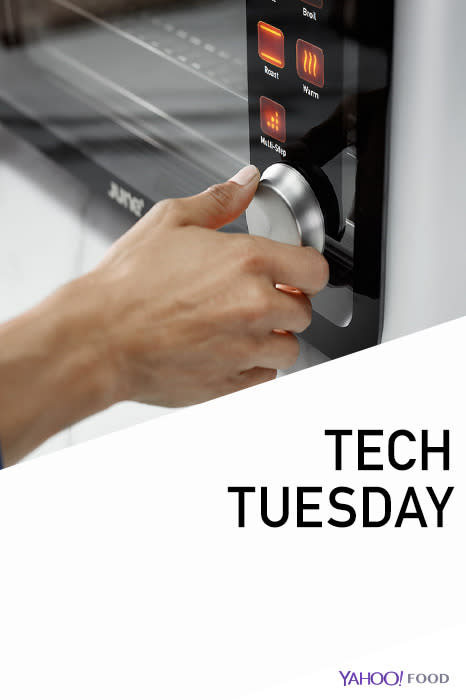
“This is the future,” Moley Robotics declared about the chef prototype it demoed earlier this year. Metal arms with articulated hands, tactile sensors, and advanced control systems whipped up crab bisque inside a custom kitchen as proof. The first robotic kitchen model will retail for about $72,000 in 2017. But home cooks don’t need to go that far to find intelligent tech for preparing perfect meals.
“In truth, not everybody wants to have food made by a robot,” chef turned commercial-kitchen designer Mark Stech-Novak told Yahoo Food. “They want that culinary touch.”
For 30 years, his Oakland-based firm has provided food service concepts, kitchen planning, and design services to a long list of clients. They include acclaimed French chef Éric Ripert, Momofuku founder David Chang, and Modernist Cuisine co-author Nathan Myhrvold. While he considers himself to be old school, Stech-Novak said he has clients who enjoy modern devices. The options seem to increase daily, propelled by crowdfunding and home chefs’ willingness to push the edible envelope.
RELATED: How the Tech World Turned on Private Chefs
We asked Stech-Novak and a few folks behind these new gadgets to give us their take on the smart kitchen equipment that has grabbed their attention.
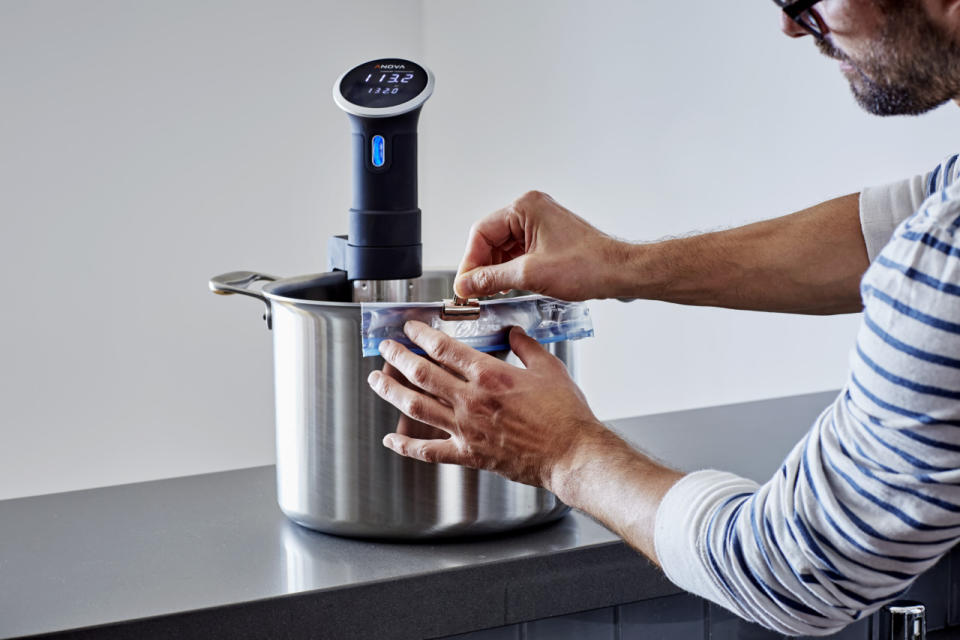
The Anova Culinary Precision Cooker. (Photo: Anova Culinary)
Precision Cooking
Sous-vide cooking used to be a pro technique only seen in restaurant kitchens and on reality cooking shows, but several companies now sell affordable devices that clip onto pots, heat water, and circulate it around food sealed in plastic bags. Foods like steak, eggplant, and lamb chops get cooked evenly and to perfection.
San Francisco-based Anova makes a precision cooker for $199 that connects wirelessly to a smartphone app via Bluetooth. A new Wi-Fi version will begin shipping in October. The app has time and temp instructions for specific dishes plus cooking controls. When food is ready, the cooker sends a phone notification. Last year, Anova raised more than $1.8 million on Kickstarter for its updated Precision Cooker.
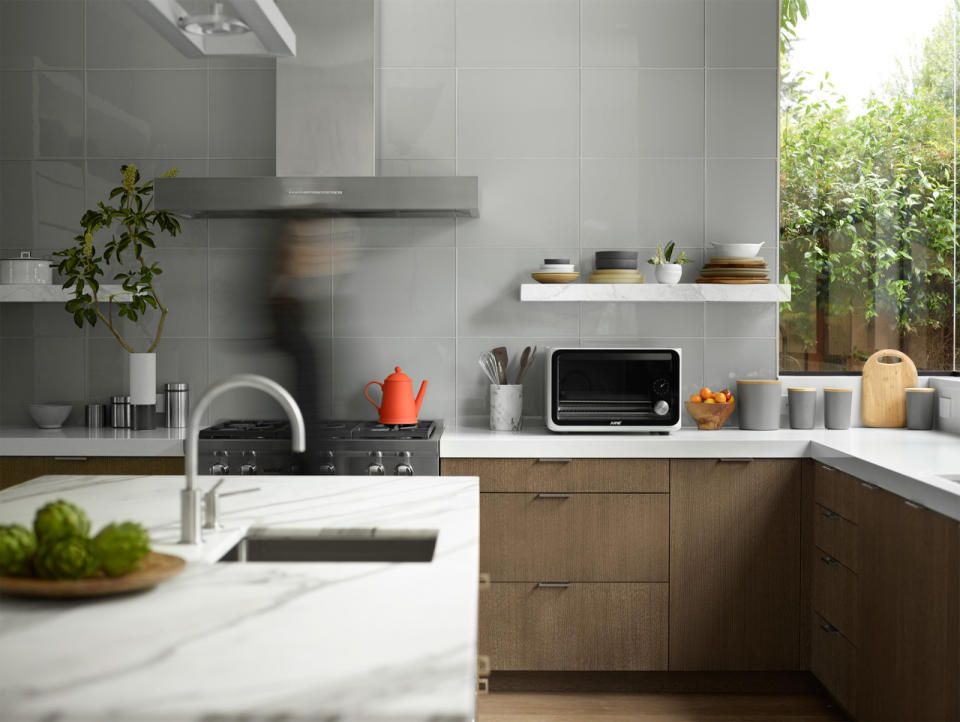
The June Intelligent Oven is essentially a professional oven on your countertop. (Photo: June Life Inc)
Next-Level Baking
“We love everything going on with sous-vide,” said Matt Van Horn, co-founder of the June Intelligent Oven. “We love food tech.”
RELATED: ‘Smart’ Pressure Cookers: Do They Work?
He and Nikhil Bhogal came up with their oven idea while preparing to quit their tech sector jobs and start a new business together. The duo, who had experience working for Motorola, Apple, Zimride (now Lyft), and the social-networking service Path, were inspired by professional ovens. They decided to unite everything they knew about user experience and interfaces with precise time and temperature control.
The June oven’s carbon-fiber heating elements reach full power in three seconds and maintain a steady temperature. An internal camera recognizes 20 kinds of food — a number the founders expect to grow — and records shareable time-lapse video. Users can program the oven with specific instructions, and advanced insulation keeps the exterior cool when the inside is 500°. The oven retails for $1,495 and begins shipping next spring.
RELATED: This Restaurant Serves Dinner From the Year 2050
Stech-Novak hasn’t tried the oven yet, but said that it seems like a perfect match of tech and simplicity. Van Horn credits the oven with helping him find the sweet spot for roasting chicken. “Figuring out how to get there and make it crispy and juicy — that’s magical.”
The June oven’s co-founders think it could replace toaster ovens, microwaves, most conventional ovens, and stovetops for everyday needs. The size is big enough to bake a 12.5-inch pizza or a whole roast with sides.
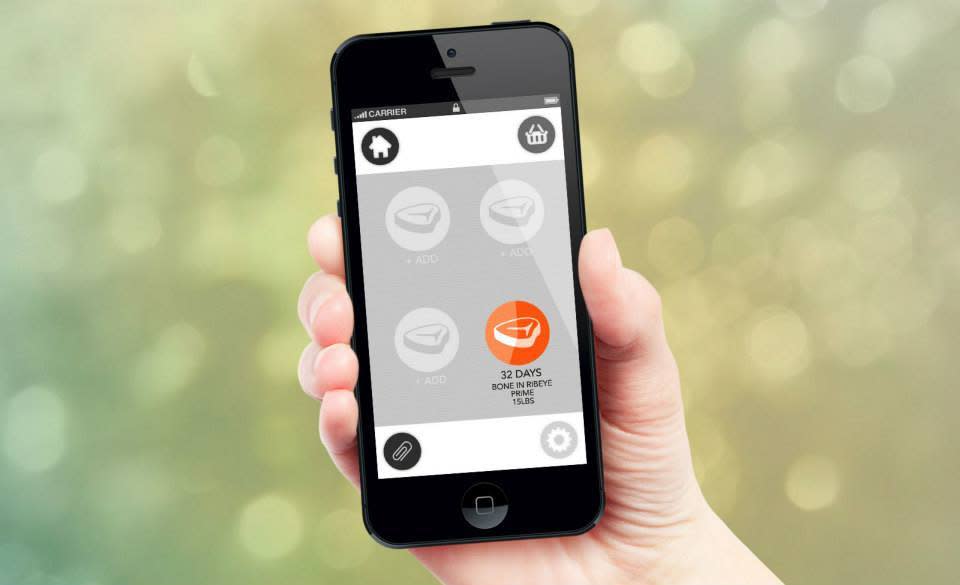
The app for the Steak Locker. (Photo: Steak Locker)
Producing Artisanal Food
The June oven team likes to preorder cool food tech, Van Horn said. Recently that included the Steak Locker, one of Kickstarter’s top 20 most funded food campaigns.
MORE: Why Japan Sent a Bottle of Whiskey Into Space
“What dry-aging does is it intensifies the flavors,” San Diego-based Steak Locker co-founder Nadia Bruno said. That flavor changes over periods of time until it’s almost like strong cheese. The smart appliance for dry-aging meat retails for $1,399, and its app controls the humidity and temperature, displays inventory, and offers recipes.
“You have everything that there is in a commercial dry-aging room, temperature-wise, in a four-cubic-foot product that you can use at home,” said co-founder Claus Schmitz.
The dry-ager has proven popular. After shipping around 600 units, Steak Locker ran out of inventory. Preorders are expected to ship later this fall. Schmitz and Bruno are also in the early stages of developing ideas for new culinary machines, including one for pasta. “Connectivity in the kitchen will make life a lot easier,” Schmitz said.
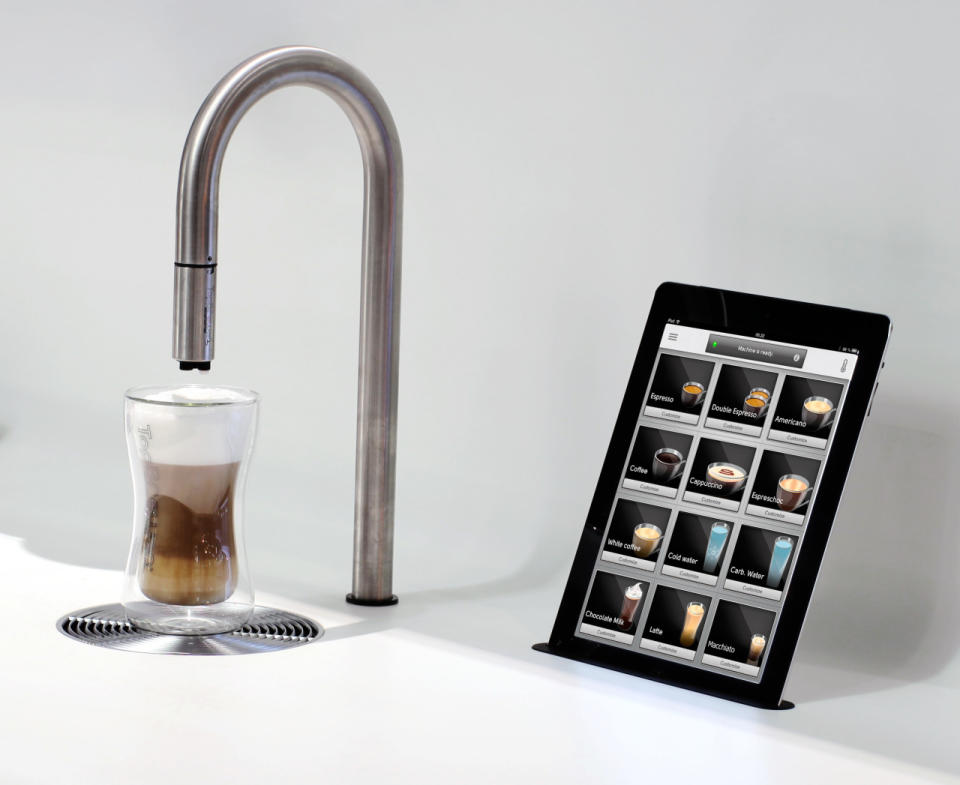
This beer brewer is synced to the Web so you can browse and make different recipes. (Photo: PicoBrew)
Brewing the Perfect Sip
Anova co-founder and CEO Steve Svajian has noticed that beer-brewing devices are popular on Kickstarter. One is the PicoBrew Zymatic, which raised more than $660,000, began shipping last year, and now retails for $1,999. The automatic appliance connects to the Internet so users can access specific recipes. “In general, the taste you’re able to get from the brewing process is one that is based on science,” Svajian said. “So you should be able to replicate various tastes.”
MORE: Meet the Young Startup Founders Taking the Food World by Storm
Stech-Novak likes a different kind of brewer, the Scanomat TopBrewer. This stainless steel coffeemaker connects to Android devices, iPhones, iPads, and Apple Watches. The machine makes an espresso to order remotely with just a tap. One of his big tech-company clients is adding a hundred to its campus, he said.
Futuristic Final Touches
So what will be the next kitchen device to go high tech? Stech-Novak isn’t sure but observed that some of his clients use centrifuges to separate foods, anti-griddles for instant chilling, and rotary evaporators for distillation.
While he’s not a “crazed technologist” himself, Stech-Novak said he appreciates what others can achieve with the right tools, even old school ones. He recalled a dish by chef Daniel Patterson that utilized lavender essence so the diner could have a multisensory experience. He rubbed the scent around the rim of a cup and warmed the vessel so that the perfume rose into the air. No apps or smartphones were involved.
“It’s a labor of love,” he said.
Alyssa Danigelis is a professional journalist based in Boulder, Colo., who covers technology, science, food, and startups. Originally from Vermont, she likes her Cheddar extra sharp. She also loves experimenting in the kitchen. Follow her on Twitter @adanigelis.

